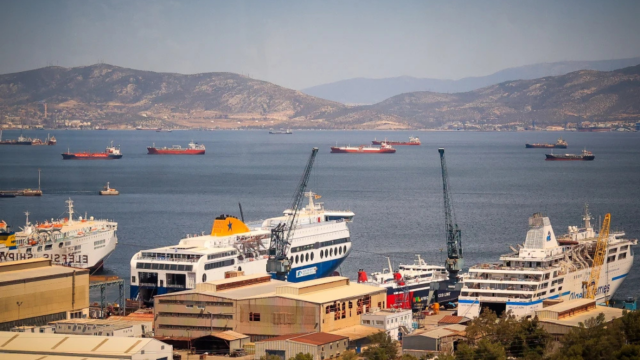The intense reaction from the Chinese embassy against US Ambassador Kimberly Guilfoyle over her statements about the Port of Piraeus is causing concern. This is particularly noteworthy since her positions were already known from the hearing process at the US Senate Foreign Relations Committee on July 9.
At that time, Ms. Guilfoyle had expressed the United States’ views on their intention to strengthen their presence in our country, particularly in infrastructure and ports. The Trump administration, from the first day of its term, has been trying to set new terms in the global economy and compete with China, which had penetrated port infrastructure worldwide.
The Elefsina port agreement that brought China-US competition
The Sino-American competition manifested in our country after the agreement for the Port of Elefsina and after the relevant bill was introduced to Parliament for ratification, providing the US with the possibility of direct investment of $125 million to transform Elefsina port into a major development center, with port, commercial, transportation, energy and defense activities, as Development Minister Takis Theodorikakos had stated.
From the first moment, the government, through the Prime Minister, responded that Athens seeks balance in relations with the two major powers, emphasizing adherence to cooperation with the Americans while simultaneously respecting past investments.
Sotiris Serbos: Greece’s geopolitical upgrade entails not only increased rights but also obligations
The Prime Minister’s advisor on Foreign Policy issues, Professor Sotiris Serbos, speaking to parapolitika.gr, emphasizes that Greece’s geopolitical upgrade entails not only increased rights but also obligations, among which is our credibility towards China.
According to Mr. Serbos, “it is absolutely positive for our country to attract American interest alongside the Chinese.” As he argues, “we can exploit and utilize this to our benefit in the future, even by providing mediation in specific understandings that will be required between all parties,” clarifying that “for us, it is a blessing that the United States wants, not to compete with the Chinese, but wants to implement all their plans in Elefsina, in Thriasio, which concern many infrastructure issues. I find it as something complementary that can essentially strengthen Greece’s role. That is, I don’t see it as ‘either one or the other’ or that Greece will get entangled in this competition of great powers. On the contrary, it is only positive for our country that it attracts the interest of the United States beyond the Chinese, who upgraded the Port of Piraeus as one of the largest in the world. So, our job is, if this entire project from the United States’ perspective in Elefsina and Thriasio proceeds, to potentially undertake the consultations that need to happen between the two sides. That is, Greece will play the role of broker, a country that will emerge victorious from this. So, I don’t see it as a zero-sum game. The Prime Minister also said that our strategic orientation is given. Nor is it questioned. But here I find an issue that Greece has the opportunity to exploit to its benefit and potentially give it an additional negotiating card in a series of issues it will have.”
Greece’s upgrade as Europe’s energy gateway is expected to be further strengthened by the new infrastructure that will be required for implementing all announced projects. One of the most significant is the implementation of the India-Middle East-Europe Economic Corridor (IMEC), for which Greece has shown great interest and was also the subject of talks between Kyriakos Mitsotakis and Indian Prime Minister Narendra Modi during his visit to India last February (21/2/2024).
IMEC has rekindled US interest, for whose implementation the upgrade of Greece’s port infrastructure is required, as Greece is expected to become Europe’s supply gateway from the Middle East. However, IMEC is considered a counterweight to the Belt and Road trade corridor that the Chinese seek to create to connect China with Europe through Central Asia and the Middle East, reducing shipping time from China to Europe by bypassing the Suez Canal and maritime routes.
As it appears, the Port of Elefsina likely represents the beginning of China-US competition in Greece, with Athens expected to be called upon to balance between the two superpowers in the distant future.




